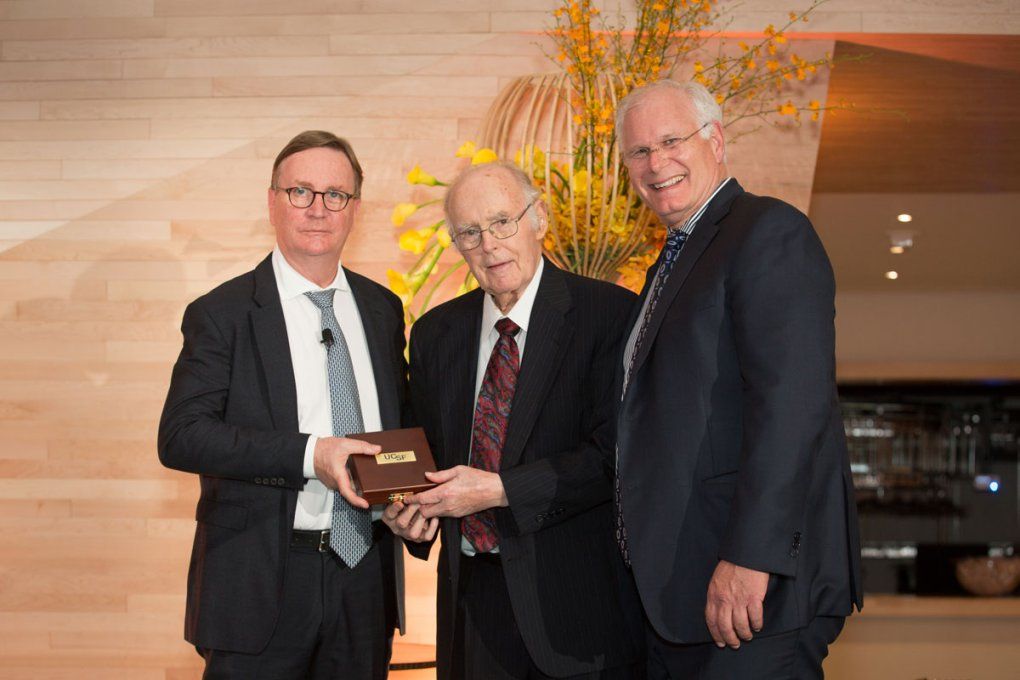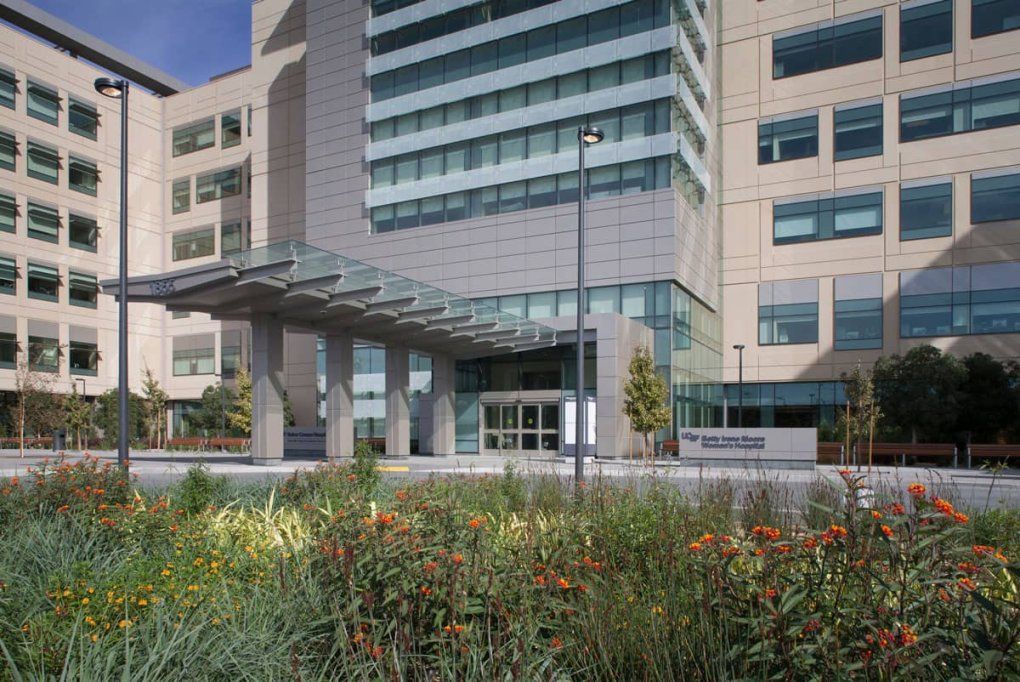By Mika Rivera
 Chancellor Sam Hawgood, MBBS, presented the UCSF Medal to Gordon Moore, with Mark Laret, former CEO of UCSF Health, in 2016. Photo by Sonya Yruel.
Chancellor Sam Hawgood, MBBS, presented the UCSF Medal to Gordon Moore, with Mark Laret, former CEO of UCSF Health, in 2016. Photo by Sonya Yruel.
The UCSF community deeply mourns the loss of Gordon Moore, who passed away on March 24, 2023, at the age of 94. A pioneering scientist and leader who transformed the technology industry, Moore also was a visionary philanthropist whose contributions have left an indelible mark on UCSF and the Bay Area for future generations. He is survived by his wife, Betty Moore; sons Kenneth and Steven; and four grandchildren.
Moore, together with Betty, contributed tremendously to UCSF for decades in ways that have sparked innovative advancements at the university’s hospitals and reimagined the patient experience. Their lead donation in 2014 helped establish the region’s first women’s hospital, which was named the UCSF Betty Irene Moore Women’s Hospital in recognition of their gift, and fueled initiatives at the UCSF National Center of Excellence in Women’s Health. Today, the hospital is a hub for translational and precision medicine to treat women at all life stages and serves as a model for improving patient safety, for which the Moores were dedicated advocates.
“Gordon was an inspiring philanthropist,” said Sam Hawgood, MBBS, UCSF chancellor and the Arthur and Toni Rembe Rock Distinguished Professor. “He and Betty were true partners and shared a vision of transformative patient care, excellence in women’s health, and championing scientific research that has propelled UCSF forward.”
They also have funded the work of numerous faculty members across UCSF, providing countless research grants and investing in the education of talented students. In 2016, the Moores were awarded the UCSF Medal, the university’s highest honor, for their contributions to nursing, patient care, and progress in the health sciences.
 San Francisco’s first women’s hospital, the UCSF Betty Irene Moore Women’s Hospital, was named in recognition of Gordon and Betty Moore’s gift in 2014 to UCSF.
San Francisco’s first women’s hospital, the UCSF Betty Irene Moore Women’s Hospital, was named in recognition of Gordon and Betty Moore’s gift in 2014 to UCSF.
Born January 3, 1929, in the small coastal community of Pescadero, Calif., Moore grew up with a passion for the outdoors, science, and experimentation. He pursued his undergraduate degree in chemistry at San Jose State College (now San José State University), where he met fellow outdoor adventurer and his future wife, Betty. He completed his degree after transferring to the University of California at Berkeley, then earned his PhD in chemistry and physics from the California Institute of Technology.
Only a few years later, Moore set off on a journey that would make him a titan and leader in the budding technology industry. He co-founded Fairchild Semiconductor in 1957, and with great intelligence, ingenuity, and foresight at the helm of research and discovery, propelled the business forward to rapidly develop new technologies that spawned successful offshoot companies – the most notable being Intel Corporation. Moore co-founded Intel Corporation and served as president, CEO, chairman, and chairman emeritus before stepping down in 2006. Under his leadership – a humble yet curiosity-driven style for which biographers dubbed him a “quiet revolutionary” – Intel created the first microprocessor and became the world’s highest-valued semiconductor chip maker.
For his seminal role in the technology industry, Moore earned the National Medal of Technology from President George H. W. Bush in 1990 and the nation’s highest civilian honor, the Presidential Medal of Freedom, from President George W. Bush in 2002.
Even at the height of his career, Moore was tirelessly committed to philanthropy, and he and Betty were dedicated to making a significant and long-lasting difference in the world. In 2000, after years of anonymous yet meaningful support for a myriad of causes, they established the Gordon and Betty Moore Foundation, which has become one of the largest philanthropic foundations in the world. Through the foundation, they have supported environmental conservation, scientific research, higher education, and generously contributed to numerous organizations and initiatives beyond the Bay and around the world.
“Almost everywhere you turn, you see the impact of the Moores. They’ve changed the world,” said Mark Laret, former president and CEO of UCSF Health. “But what we focus on is so much what they’ve done in health care and at UCSF, and it’s hard to overstate their impact.”
Moore will be greatly missed by the UCSF and Bay Area community, and he leaves behind a legacy of ingenuity and generosity that will endure – one that will continue to have a profound impact on the world for years to come.




